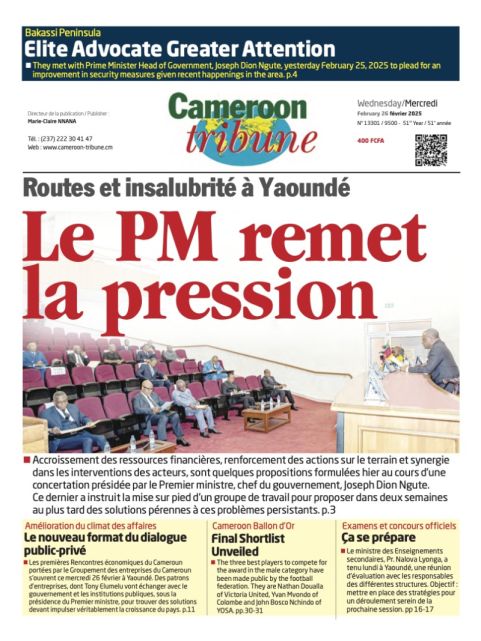Scientific Research: Rendering The New Dawn Useful
- Par Godlove BAINKONG
- 21 août 2023 12:20
- 0 Likes
Scientific research in Cameroon has since August 8, 2023 been bolstered and hopefully, researchers are more than ever before determined to show forth their know-how in inventions and innovations. In effect, Presidential decree No.2023/337 of 08 August 2023 to lay down special rules and regulations governing research personnel, signalled a new dawn for these natural persons engaged in the conception or creation of new knowledge, products, processes, methods or systems based on scientific programming. This, as their brain works contribute to resolving problems and developing humanity. Vital growth actors worth valorising indeed!
Their reactions following the Presidential Act showed how highly-awaited the change was. Obviously so as the researchers had gone for long under very difficult working conditions and unclear career profile. It even emerged from one of the randomly-selected reactions that the researchers had hitherto been working under the auspices of an old laid down regulation of 1980 which was obsolete, to say the least. The new functional decree therefore spells out their rights and responsibilities. It outlines the procedure of research, remuneration conditions and honorary distinctions as well as the retirement age of researchers. For instance, the retirement age has been taken from 55 to 65 years. A robust stimulus to a vibrant sector in realising the much-cherished growth blueprint which targets the structural transformation of the economy.
The beneficiaries hold that it is a positive evolution given that many researchers were evolving and then going on retirement just when they were matured enough to plough back development to the country.
As a matter of fact, just when they were ripe enough to give back to the country what she gave them, the researchers were caught up by ‘early’ retirement from the civil service and were almost always picked up thereafter by international organisations at the detriment of the government which invests so much yearly in their training.
This explains why they saw in the Presidential decree a good thing for the State as well as for researchers and the community. One of them said, “Researchers will become more stable and develop more that will produce good results as prescribed by the 2020-2030 National Development Strategy.” Their excitement will no doubt galvanise the researchers to go deeper into their laboratories and hopefully propose inventions and innovations that are susceptible to changing lives and livelihoods.
To whom much is given, much is expected, so goes a dictum! Visibly if their enthusiasm is anything to rely on, then their scope of work with revolves around engaging in research as a main or permanent activity; enhancing and popularising research findings; ensuring the promotion of science as well as supporting innovation and development would shoot for the skies. This is an opportunity that government can, and must, capitalise on. Research is generally known in modern societies as a highly creative activity given that it produces discoveries, creates new jobs and new industries, cuts costs of production, and makes remarkable impact to economic growth and overall national welfare. Simply put, research is the springboard of economic growth in any modern industrial nation.
As researchers celebrate their renaissance, the powers that be should not lose sight of the fact that the status is just a fraction of interwoven factors that can use scientific research to transform an economy. A motivated researcher certainly needs the means and equipment to showcase his/her ingenuity. Government therefore needs to invest methodically in research. It is an open secret in emerging countries that research and development (R&D) constitute an essential driver of economic growth as it spurs innovation, invention and progress. Investing on research and development can therefore lead to breakthroughs that can drive profits and well-being for the population. Little wonder most visionary companies systematically allocate about 15 per cent of their yearly business turnover for research and development. The State should therefore do more; and more so, an underdeveloped but aspiring economy like ours.
The environment should be made more conducive for easy technology transfer, cross-border scientific collaboration and policies that fund basic research so as to foster the kind of innovation a country needs for long-term growth. While applied research is important to publicize innovations, basic research expands th...
Cet article complet est réservé aux abonnés
Déjà abonné ? Identifiez-vous >
Accédez en illimité à Cameroon Tribune Digital à partir de 26250 FCFA
Je M'abonne1 minute suffit pour vous abonner à Cameroon Tribune Digital !
- Votre numéro spécial cameroon-tribune en version numérique
- Des encarts
- Des appels d'offres exclusives
- D'avant-première (accès 24h avant la publication)
- Des éditions consultables sur tous supports (smartphone, tablettes, PC)











Commentaires